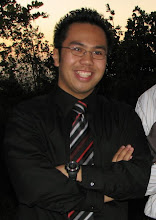 Above: I-95's southernmost exit that leads Key Biscayne. After this exit, I-95 ends and merges onto the busy U.S. 1, Dixie Hwy.
Above: I-95's southernmost exit that leads Key Biscayne. After this exit, I-95 ends and merges onto the busy U.S. 1, Dixie Hwy.If there's one lesson that I'm going to have to walk away from Miami with, it would be,
A RECIPROCATED QUESTION IS A GOOD THING.
(MOST OF THE TIME)
And how exactly did I come up with this conclusion? I thought of it as I was observing several of my preceptor's teaching styles.
Case 1: One of my doctors at my previous mini-rotation looked me in the eye after I asked him, "Is the diagnostic glucose level for Diabetes at >125 mg/dL?" He then said, "Is it?" I nervously replied (with more confidence put into the last word than the first), "I think it is." He nodded and then said, "You are right." I sighed a breath of relief.
Case 2: This week, a patient with rheumatoid arthritis walks in, and I noticed the patient had a neck injury in the past that caused lower body paralysis. In a rather naive tone, I ask the doctor, "Is that caused by atlantoataxial subluxation?" As he was entering patient data into the computer, he asks me, "What do you think?" I just ended up throwing a Hail mary by shooting out a "Yes" from my lips. He nodded with me as I began to feel the sweat near my forehead and said jokingly, "That's right... Why do you ask questions to which you already know the answer?" This was a rather deep point that simply brought a smile to my face. At that point in time, I just didn't know why.
I'll admit that getting a reciprocated question always makes me second guess, but I found that my preceptors are trying to see how confident I am in my answering. However, a reciprocated question has other uses than to say "you're correct." I've seen myself and other students get reciprocated questions, and the question is designed to develop the student's case for diagnosis & management of the patient. I've been through times where I'll explain my case completely, and the doctor will then tell me otherwise, with the consolation of acknowledging my train of thought made sense, but probably wasn't practical.
Making a strong case is of the valuable qualities of being a doctor I'm still trying to work on, as it is important to defend what I think is best for my patients. I'm glad Miami got me started to work on it.
----
After writing underneath my pen nickname "TENergy" for the last year, I've decided to put my real name down just so my adventure can have a real face to it. Thanks for reading!


Reciprocated questions force one to commit to an answer or decision. We are more likely to remember the answer to the question if we answer it for ourselves than when the answer is given to us. (That is what makes the answer stick; commit to an answer. Whether accurate or not, we committed an answer.)
ReplyDelete